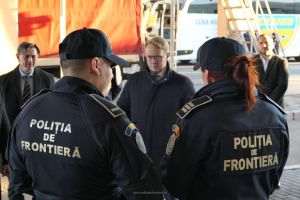Romania"s banking system, faithfully mimics the economy and its major players, says Nicolaie Hoanţă, who has now gone back to his career as a university teacher, after leaving his position as chairman of Banca Comercială Carpatica. As an outside spectator, he now criticizes banks as well as the government for their role in the current state of the economy. In his opinion, distressed assets are the main issue that the Romanian banking system is facing.
Nicolaie Hoanţă said: "The banking system was seriously shaken by several factors, such as the inconsistency of an economy over reliant on consumption, disjointed and incapable of supporting the coming generations of workers, the mistakes of the central bank in not watching the indebtedness of the population (in an attempt to generate an illusive economic growth), the strong deterioration of public finances (through taxation which is unsustainable for the budget and unfair to ordinary taxpayers). Compound that with the effects of the great world financial crisis, and we now have the full picture of the state of the Romanian banking system, which will persist in the coming years >.
According to Mr. Hoanţă, neither the authorities, nor the Central Bank care about the fate or Romanian companies, "what"s left of them", and are completely indifferent to learning from other countries who help their private environment work: "Nobody seems to care that for few years from now it will be basically impossible to have new domestic companies strong enough to endure appear on the domestic".
• The interest rates will be forced to go down, but lending won"t resume
Banks have already cut the interest rates for loans and deposits, after the Central Bank gradually lowered the key policy rate to 7% a year, and have launched campaigns to promote borrowing. However, analysts say that demand for loans will take a while to return, due to shrinking income and rising unemployment.
Nicolaie Hoanţă considers that banks will be forced to lower interest rates for deposits as well as for loans, but this will not boost lending. "we shouldn"t forget that loans are given to companies that work, which is quite different from what some people say, that there"s a swarm of companies eager to borrow", Hoanţă said, who added: "Both the public and the private sectors of the Romanian economy are currently in a deadlock. Our economic relations with other countries aren"t working simply because those countries still have and will continue to have economic, social, and financial issues, even though they are trying to sweep them under the rug. Based on all this, we can say that there is no way lending will resume this year, since it lacks the "engines" and it can"t take off simply based on wishful thinking and expectations which aren"t supported by the market conditions".
Due to lack of demand from the private sector, banks will continue to lend money to the government. Due to its stringent need for cash, the Ministry of Public Finance last year raised 65 billion lei from domestic banks, and another 8.61 billion in the first two months, at a lower yield.
The statements that lending is about to resume and the economy is starting to recover are < slogans >, that not even the most naïve believe in anymore", Mr. Hoanţă says. "Too many officials have compromised their image with false statements, which were probably meant to boost the morale of the population, because there needs to be someone to keep in check those who feel the outcome of policies, systems and even countries crashing one after another", he said.
Bank deposits, which increased last year due to the large interest rates, "will certainly decrease over the coming period, in terms of volume and aggregate size, as poverty and unemployment increase, and due to the inability of the public finance system to support the economic recovery and social stability etc".
• Gloomy outlook for the economy - until 2012
The Government and the International Monetary Fund are expecting Romania"s economy to grow 1.3% this year, with the worst case scenario presented in Romania"s convergence program for the 2009-2012, being a growth of just 0.2%. Far more pessimistic, Nicolaie Hoanţă thinks Romania"s economy won"t recover before 2012. "I"d even go as far to say, that, judging by the way things are going, whether we"re talking about the underground or the official economy, not even the Western economies that sparked or perpetuated the current economic crisis, won"t see a recovery before 2012".
• A "National Rescue Plan" is imperative
Nicolaie Hoanţă lists four problems of the Romanian economy, which according to him would require the implementation of a National Rescue Plan.
The rising unemployment, the bankruptcy of a large number of Romanian companies, due to the lack of support of the authorities, an ongoing disarray of the economy , a public finance system which is nearing collapse (with no current and future revenue sources) are the main issues that the economy is facing, according to Mr. Hoanţă. < The Presidency, the Parliament and the Government need to take action instead of waiting for the events to turn Romania into a second Greece, which is now at the mercy of the world"s sharks which are looking to seize its land and monuments >, Mr. Hoanţă says.
Nicolaie Hoanţă was the former chairman - general manager of Banca Comercială Carpatica until October 2009, and is now a university teacher. He is now working on reprinting several books as well as working on a new one. Nicolaie Hoanţă declined to comment his departure from < Carpatica >, saying only that everyone is free to study things and draw their own conclusions.
• Hoanţă doesn"t expect Carpatica will be sold off this year
One of the few banks with a domestic majority shareholder, Banca Carpatica represents a takeover target for foreigners, and speculation on this issue are quite common. However, Nicolaie Hoanţă says that BCC shareholders are not willing to sell it off this year: "They will continue to back the bank, which is why they approved a new share capital increase".





























































